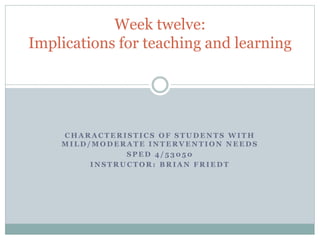
Week 12 implications_fall
- 1. C H A R A C T E R I S T I C S O F S T U D E N T S W I T H M I L D / M O D E R A T E I N T E R V E N T I O N N E E D S S P E D 4 / 5 3 0 5 0 I N S T R U C T O R : B R I A N F R I E D T Week twelve: Implications for teaching and learning
- 2. Where we’re going This week: Evidence-based practices in general What they are What they mean Why we should seriously consider their use Evidence-based practices specific to our areas of disability Do they exist? What are they? In the very near future: Interview presentation is due on December 4!
- 3. Evidence-based practice A treatment or intervention that: has a clear operational definition, targets a socially valid student outcome or behavior, is shown to positively affect target outcome by a sufficient number of research studies that show experimental control. experimental, quasi-experimental, single subject research Essentially, EBPs are treatments or interventions that good research suggests will work to affect positive change in students in classroom settings.
- 4. Will EBPs always work? No. However, as a field, we probably ought to: Use the treatment most likely to work first. If that fails, move to the next most likely treatment. And so on...
- 5. Do EBPs restrict teacher creativity? Not really. Good instruction still relies heavily on the specialized knowledge of a teacher. You have to know your students. You have to know the characteristics of student disabilities. You have to be able to get an EBP to work for you. That said: There are critical components to all treatments, things that can’t be changed without throwing everything off. Implementing EBPs with fidelity is important.
- 6. Why should we use EBPs? We want to secure positive outcomes for our students. Academic Social Adaptive Behavioral EBPs have the support of research. If we use them well, they can secure the outcomes that we want for our students. That’s what they are supposed to do. And. There’s a legislative imperative to do so.
- 7. Why shouldn’t we use EBPs? Maybe things don’t generalize to other settings. Maybe we can’t know stuff. Maybe there is no such thing as an evidence-based practice. For a much more refined statement of this position, see: Gallagher, D.J. (1998). The scientific knowledge base of special education: Do we know what we think we know? Exceptional Children, 24, 304-314.
- 8. Current state of EBPs Not used to as much as they could be in the field, for a variety of reasons Unclear what practices are evidence-based No clear warehouse for EBPs; teachers don’t generally go into the research to find them on their own Teachers generally rely on personal or informal sources of information to inform their practice It’s harder to implement an EBP with fidelity than it is to do something else
- 9. Readings... Cook, B.G., Landrum, T.J., Tankersley, M., & Kauffman, J.M. (2003). Bringing research to bear on practice: effecting evidence-based instruction for students with emotional or behavioral disorders. Education and Treatment of Children, 26, 345-361. Odom, S.L., Brantlinger, E., Gersten, R., Horner, R.H., Thompson, B., & Harris, K.R. (2005). Research in special education: Scientific methods and evidence-based practices. Exceptional Children, 71, 137-148.
- 10. More readings... Four articles: Lloyd, Kavale, and Forness (1999) Broad overview of several meta-analyses Landrum, Tankersley, and Kauffman (2003) What works for students with EBD? Vaughn and Linan-Thompson (2003) What works for students with SLD? Browder et al. (2006) Reading instruction for students with CD
- 11. There is a lot of reading this week Consider these ideas as you read: How do the recommendations in this literature align with what you already know about the characteristics of each disability category? How trustworthy, useable, and accessible is this information? Have the researchers presented strategies that you could use in an instructional setting? Is this kind of thing important? As special educators, should we be following the broad guidelines laid out here?
- 12. Enjoy the reading Keep on trucking on your interview projects.